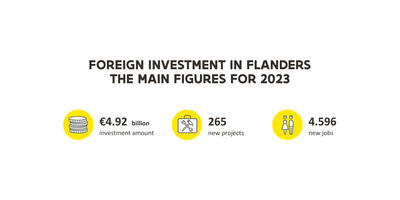
Europe’s first vaccinopolis to be launched in Flanders

The vaccinopolis will be the first of its kind in Europe, with the goal of assessing the performance of several different vaccines at the same time. In this way, the project plays a crucial role in accelerated vaccine development, as it enables researchers to rapidly collect specific data and information needed during the process. As such, it can shorten the vaccine development process down to a year and a half, so that vaccines can reach markets – and patients – sooner in the future.
A first in Europe
Vaccinologist Pierre Van Damme of UAntwerpen, one of Flanders’ universities, and immunologist Arnaud Marchant from ULB, will lead the new anti-infection unit. The project includes two main phases. Firstly, the city of Antwerp will accommodate a new quarantine facility for controlled human infection model (CHIM) studies. To date, CHIM studies were only possible in the US and the UK, but with this new project, European firms can perform these key studies close to home. For each study, the quarantine facility in Antwerp will intake 30 healthy subjects, vaccinating 15 of them. The subjects are exposed to attenuated versions of a virus, or even to the virus itself, provided that effective therapy is available. Afterwards, they are closely monitored.
For the second phase, a cutting-edge new immunology lab will be built in Brussels, the capital of both Belgium and Flanders. There, Marchant’s team will analyze patients’ immune responses to vaccines and viruses. “We will examine, among other things, how vaccines stimulate effective immune responses, optimal vaccine compositions and proper dosage,” Marchant explains.
Poliopolis
The new vaccinopolis relies on a strong track record of local talent and expertise. In 2017, for example, Van Damme was head of a similar temporary project in Antwerp. His ‘poliopolis’ made headlines across the world when two candidate vaccines for polio were tested in a quarantined container village. “It was a huge success. The study made it clear that the two vaccines were safe to use,” says Van Damme. “With the new vaccinopolis, we hope to pull this off for many more vaccines in the future.”
The vaccinopolis will be a unique and revolutionary project. It will enable newly-developed vaccines to reach markets much sooner and offers key financial advantages: “CHIM studies enable researchers to estimate the efficacy of potential vaccines faster and better. Researchers also avoid setting up expensive studies for vaccines that have potentially poorer outcomes,” Marchant explains.
Now is the right time
About 130 different organizations, many of which are located in Flanders, are currently working on a coronavirus (COVID-19) vaccine, with promising results so far. Whether or not the vaccinopolis will be able to make a difference in the development of a COVID-19 vaccine all depends on timing: the anti-infection unit is planned to be operational from early 2022.
Van Damme is convinced that the project will play a part in the COVID-19 vaccine quest either way, and certainly in future epidemics: “Suppose there are three or four potential vaccines for COVID-19 by the end of 2021. At the vaccinopolis, we will then be able to rapidly determine how effective each of these candidates is. Moreover, more epidemics are likely to follow in the future. I’m confident that the vaccinopolis will prove essential in preparing for this eventuality,” Van Damme concludes.
About Belgium and Flanders
With Dutch as its official language, Flanders (Dutch: Vlaanderen) is the autonomous northern region of Belgium. The capital of both Belgium and Flanders is Brussels.


